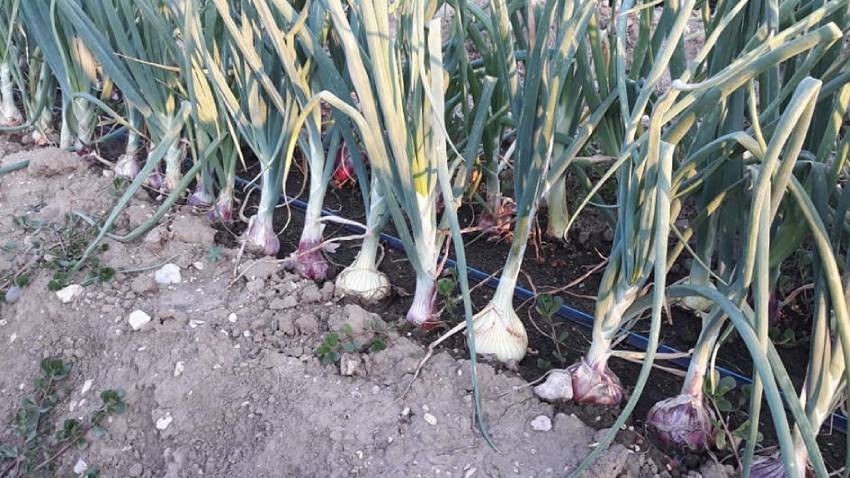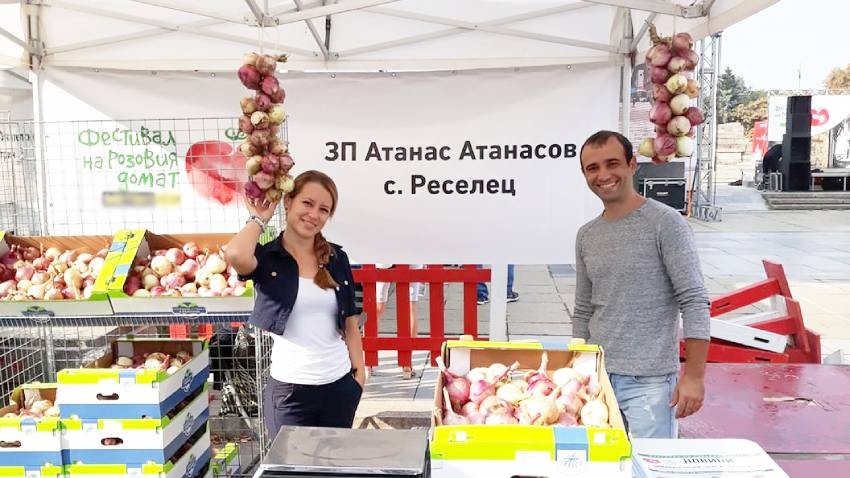Besides with the beauty of its landscapes, Reselets, a village surrounded by beautiful canyons and sheer cliffs, is also famed for a special kind of onions grown in the region of the village and nowhere else.
In this part of Bulgaria’s Northwest, onions rule over everything eaten in every home. But they are not just any onions, but a very special onion variety. The locals claim they can be eaten like apples. Atanas Atanassov, economist by profession, came home to Reselets some time ago to start growing this unique vegetable. “I used to live in London, and I decided to come and live in this village in what is probably the poorest region of Europe, because I believed you can be happy in Bulgaria, in a village, that it is possible to earn enough money here,” Atanas says in an interview with BNR’s correspondent in Pleven Latinka Svetozarova.
But what makes this ordinary looking vegetable so special? Most of all the fact that it is sweet, and juicy as a… ripe pear. “It is not hot in the least, just a bit so you know you are eating an onion,” Atanas explains and adds:

“My research has shown that the taste is connected with the river and the water. The location where it is grown is very specific – the mouth of the river Ruchene which traverses a karst region with caves. The area where we grow it has limestone deposits that are thousands of years old which actually neutralize their pungency. It is the same thing with the water we use for irrigation. The climate also matters – there are two river canyons that cross here and the air changes thousands of times a day. Many have tried their hand at growing the onions elsewhere – getting the shape and size right, but never the taste,” Atanas Atanassov says.

Reselets onions have been grown in the village for close to 600 years, and they have become emblematic of the entire region - the locals have actually dedicated a festival to them. Every autumn it brings together onion growers and guests from all over the country who “pay tribute” to their uniqueness. The onion bulbs vary in shape, and can be pink to purple coloured, or yellow to brown. And as they are watered regularly, the onions are crispy and juicy. They are also rich in minerals and salts, and have many health benefits – especially with diabetes and cardiovascular diseases.

Where and how are these onions used?
“More often than not both hands are used to break the bulb and eat it fresh,” Atanas says. “If not it is used as an ingredient in salads, and most of all at wintertime – that is when it is in demand most. Especially as Christmas nears,with pork. When cooking the traditional pork, add the onions five minutes before taking the meat out of the oven. Then you can eat the onions and forget about the meat,” Atanas says.
Growing Reselets onions is hard work because everything is done by hand – ploughing, harrowing, then planting. They have to be watered every day, and by the beginning of September – harvested. The onions are then braided and can last until December-January. A traditional recipe for Reselets is luchnik made out of the local onion variety, eggs and cheese.
More about food in Bulgaria:
Interview by Latinka Svetozarova, BNR correspondent in Pleven
Text by Veneta Nikolova
Photos: Facebook /Atanas Atanassov
The Association of Bulgarian Schools in America invites children from the Bulgarian community in North America to participate in a competition dedicated to November 1 - National Awakeners' Day, the organization announced on its..
Robert Joseph Miller, Bulgaria’s Honorary Consul in Nevada, was awarded the prestigious “Golden Laurel Branch” of the Ministry of Foreign Affairs for his exceptional merits in maintaining the diplomatic relations between the US and Bulgaria. The award..
The cool autumn evenings give us a reason to immerse ourselves in the cosy atmosphere of restaurants in Sofia and try new flavours inspired by global culinary trends. Leading Italian travel platform praises Sofia in autumn..
Switzerland is one of the smaller Central European countries on the Old Continent. It consists of twenty-six cantons with a population of about 9 million..
Bringing youthful energy, colour and cheer to the Bulgarian National Radio studio, students from the Bulgarian Sunday School Dr Petar Beron arrived..
At the outset of the war between Russia and Ukraine, the Bessarabian Bulgarians across all lands marked their national day with prayers for peace. Nearly..

+359 2 9336 661
